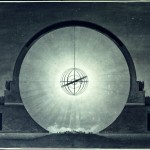If the diagnosis of our “technocratic paradigm” is that it distorts our basic attitudes and fundamental relationships to God, to the created world, to each other, and to ourselves, then this sort of theological instruction and spiritual application is at least as practical and actionable, if not more so, than the application of natural law principles to policy. Without the conversion of heart and mind, all the policy modifications in the world will amount to more of the same, and even that for the very few who will actually have any capacity to have an impact on policy.
Pope Francis’s focus on theological vision and fundamental attitudes reflect his debt to Romano Guardini, another great Bonaventure scholar. Guardini, the Italian-born, German-raised theologian and philosopher, was supposed to be the subject of Jorge Bergoglio’s doctoral dissertation before he abandoned his studies, but Laudato Si might be a kind of proxy thesis. Guardini’s The End of the Modern World is threaded through the whole document, and, like Francis’s encyclical, it focuses on the animating mentality of the modern worldview. Guardini is quite sure that modernity and the “technocratic paradigm” have distorted our perception in tragic ways, and yet we cannot unwind the clock. We are in the technocratic paradigm, we are formed by it, and we enjoy its benefits. Any solution we arrive at will only be in and through that paradigm, even as we become more and more aware of its limitations, its blind spots, and, indeed, its perversities.
Reno believes that Laudato Si is rife with contradictions that “threaten the cogency of the whole,” because Francis critiques the hegemony of the technocratic paradigm and then offers solutions that would involve techno-savy global conversations. But Francis, following Guardini, believes it is foolish to think that we can opt out of the technocratic ethos in which we were raised. We are in it, and we have no simple alternative. We cannot expect the global community simply to convert its ways, to turn on a dime and embrace an “integral ecology.” Like heroin addicts, we would harm ourselves more than help if we tried to go cold turkey. Technocratically-born solutions may have to be employed, like methadone, to wean us of our addiction to the technocratic paradigm. The difference is that these solutions, taken up into a broader theological and anthropological vision, will, we hope, be less addictive habits that are easier to break. Reno and other critics crave more “teaching” in LS, and by that they seem to mean a reasoning-through of what to affirm or deny. But Francis lacks specificity in his recommendations not because he’s wishy-washy or because he hasn’t studied Scheeben, but because the teaching he offers requires a fundamental conversion, a metanoia, a change in our way of seeing. Only in light of this deep change will we be able to see the difference between the call of the Gospel and a well-intended facsimile of it.
In his homilies on 1 John, Augustine addresses the “many antichrists.” Drawing on the moral tradition that understands Antichrist as a hidden corporate body of hypocrites whose hearts turn against Christ but who stay within the church, Augustine says “John is about to describe and designate the Antichrist: we shall soon see who they are; and everyone must question his own conscience whether he be such.” For Augustine, Antichrist was less the demonic ‘other’ and more a symbolic tool for diagnosing the compromised and sin-sick soul. Francis is not naïve enough to think that we can simply extract ourselves from the compromised way of life that wounds the earth and harms the poor. Like Augustine, he invites us all to “question our conscience whether we be such.” Only then can we renew our vision and change our approach.
Perhaps then we can finally work toward some creative policy solutions. But maybe only then.
See my interview with Catholic climate expert Anthony Annett for more on integral ecology.
Note as well that there is now a 2016 transhumanist presidential candidate who advocates a total break with nature as we know it.
















